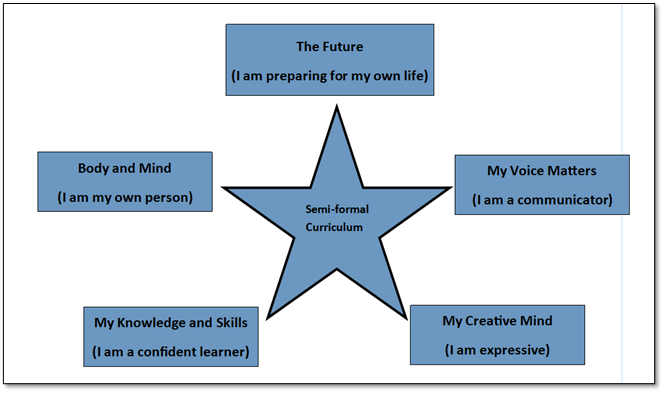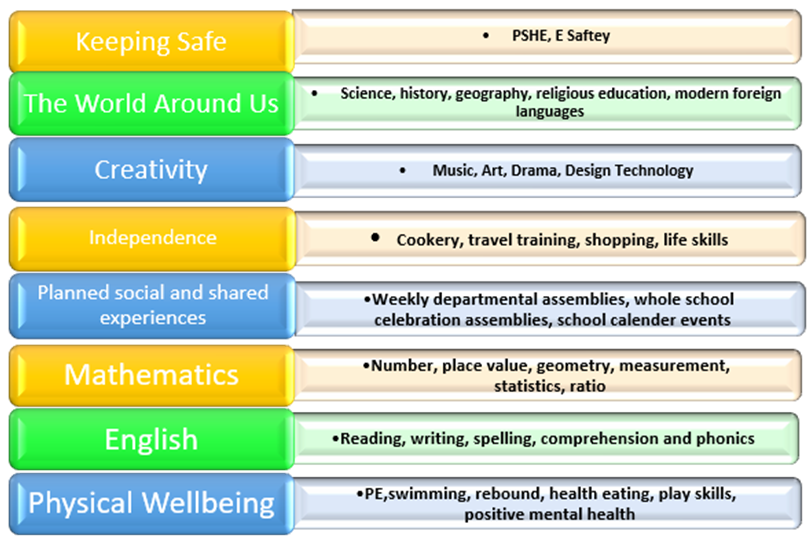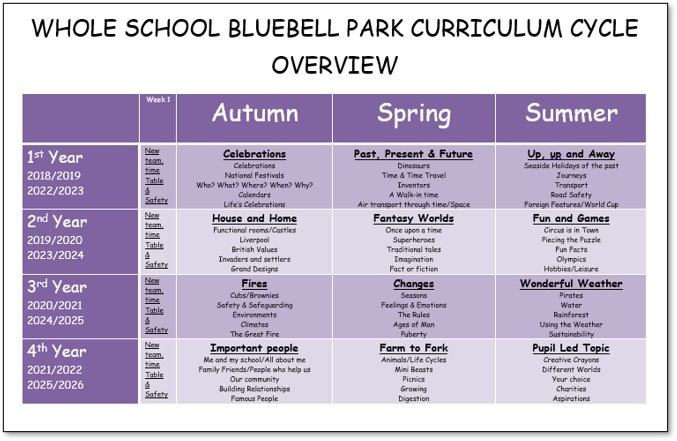Pre-formal Curriculum
Our Pre Formal Curriculum is for our PMLD learners.
Pre formal learning is not dependent on the subjects of the National Curriculum. Our planning is topic based and learning opportunities are used to allow Repetition of routines, repetition of vocabulary, providing pupils time to process, anticipate and respond.
The Pre Formal Curriculum focuses on 3 core areas of learning:
Communication–
Communication only needs 3 things:
- Means
- Motivation
- Communication partner
In the pre-formal curriculum, staff use a total Communication approach, where learners are encouraged to use whatever form of communication is appropriate for them as individuals.
Intensive Interaction is used to support Communication.
Knowledge and Skills–
Awareness, Exploration, Early problem solving, Sequence and Pattern.
Physical Development–
Body awareness, Fine Motor skills, Gross Motor skills.
There is also a focus on therapeutic activities such as hydrotherapy, rebound therapy, physiotherapy, speech and language therapy, intensive interaction, sensory integration and physical development programmes.
In a Pre Formal learning classroom you can expect to see:
|
Personalised Learning opportunities |
Consistent routines |
Practising skills |
|
Repetition |
Objects of reference |
Sensory based learning |
Pre-formal learning may look like:
|
Sensory exploration |
Sensory cookery |
Sensory story |
TACPAC |
|
Music |
Art |
Physiotherapy |
Hydrotherapy |
|
Rebound Therapy |
Massage |
Targeted physical intervention session |
|
As an indication of how learners might progressively engage can be seen by adapting a scale we have adapted from Erica Brown which she noted as a Framework for Recognising Attainment (Brown, 1996). All learners might not go through this scale in the order noted, and it is not necessary that they do, but this is a broad indication of the possible stages.
There are 8 areas of Engagement that we use:
Semi-formal Curriculum
The semi-formal curriculum is followed by our SLD cohort, (pupils with Severe Learning Disabilities) most of whom also have a diagnosis of ASC (Autistic Spectrum Conditions).
Their learning needs are met through the EQUALS informal/semi-formal curriculum, and their learning is assessed and tracked through the use of Evidence for Learning and B Squared Connecting Steps. The intent of the semi-formal curriculum is to develop knowledge, skills and understanding relevant to the whole life of the learner, which is not bound to singular subject areas. The focused areas of learning are as follows:
- Body and Mind (I am my own person)
- My Future (I am preparing for my whole life)
- My Voice Matters (I am a Communicator)
- My Knowledge and Skills (I am a Confident Learner)
- My Creative Mind (I am Expressive)
The semi-formal curriculum aims to provide a motivating and engaging learning experience to ensure our SLD learners reach their potential in all areas. We aim to provide a curriculum that is fully supported by consistent, school- wide visuals.
While the learners working within the structured pathway need high levels of adult support throughout their time in school, it is also recognised when learners are ready for adults to take a step back and withdraw prompts to promote independence. Teaching is provided through clear, explicit instruction in a way that suits the learner – one to one, in small groups, as part of the whole class or a mixture. Through the structured pathway, the curriculum is promoted through a scaffolded ‘spiral’ with clear steps for progress.
Formal Curriculum
The formal curriculum is child centred, with the intent to teach pupils to take ownership of their learning, investigate and interact in the wider world. Generally, pupils on the formal curriculum demonstrate that they are ready to learn with some pupils showing curiosity to acquire new knowledge. Pupils are working significantly lower than age related expectations, although they are able to access the curriculum in a more formal teaching and learning environment. Life skills and independence still form a large part of this curriculum.
Pupils will work on 8 areas of learning;
The curriculum focuses on developing the key skills of communication, cognition, independence, physical development and self-care. The curriculum for formal learners is implemented through a sequenced, long term cycle of planning. This curriculum enables pupils to engage in more formal, structured and discrete lessons. These lessons are adapted accordingly so that they are practical, build on prior learning and consolidate knowledge and skills.
What Can I expect to see in a classroom teaching through the ‘Formal Curriculum’?
Pupils working on the formal curriculum will be learning through subject specific teaching. Working through an adapted National Curriculum, core and foundation subjects are delivered alongside development of independent skills including, travel training, life skills and in key stage 4, work related learning. Pupils will be working independently and in small groups and have access to a range of resources. Classroom displays will be a mixture of topic based, celebration displays and working walls to support learning.
Curriculum for formal learners is implemented through a sequenced, long term curriculum cycle of planning; created by the TLR team. This curriculum enables pupils to engage in more formal, structured and discrete lessons. These are adapted accordingly so that they are practical, build on prior learning and consolidate knowledge and skills. Where there are subject specific sessions being taught the intention is to focus on the learners individual EHCP targets. Pupils who are capable of accessing early content of the National Curriculum do so, taking into account their individual learning styles and preferences. Some Post 14 learners who are capable of working towards gaining accreditation qualifications are supported to achieve this.
The formal curriculum endeavours to have a positive impact in all areas of pupils learning and development. This curriculum is delivered in a way that ensures pupils can leave school with the confidence, self-help and life skills that promote overall independence. In turn pupils will be able to confidently enter their journey into adulthood.






